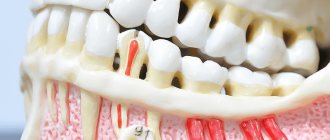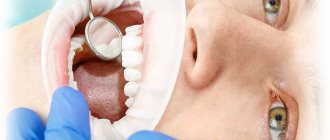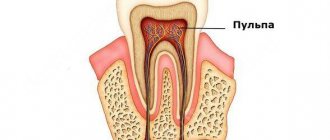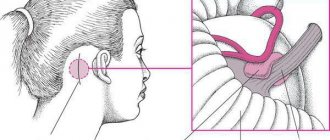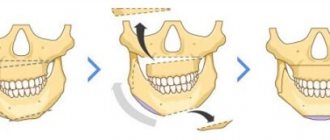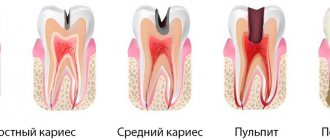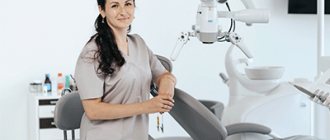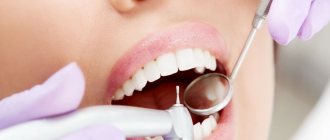Spending a long time in the cold or severe hypothermia can lead to inflammation of the dental nerve. The dental nerve can also become inflamed in hot weather, for example, if the window in your car is open. Inflammation of the dental nerve is an unpleasant disease; it may be indicated by symptoms such as the appearance of painful pulsation, constant aching pain in the tooth. If these symptoms are present, it means you have the nerve of the tooth is chilled. The very first thing to do is to understand which tooth is damaged.
Healthy teeth do not react in any way to temperature changes; usually we do not notice it at all. But if any pathological processes occur inside the dental shell, then from a long walk in the cold you may feel severe toothache. The most correct decision in this situation is to seek help from a dentist.
What to do if the nerve in the tooth has caught a cold - symptoms, treatment and prevention
After a long stay in the cold, your tooth may ache. In this case, aching pain with twitching usually occurs - this is a direct sign of a cold nerve. If your teeth are in perfect order, they should not give any reaction to temperature changes. But if there is a pathological process, including a hidden one, it can worsen as a result of hypothermia. Further in this article we will talk about what to do if the nerve of the tooth has caught a cold, and how to quickly get rid of toothache and prevent the development of complications.
If the third molar hurts
Very often, after a wind blows, or after hypothermia, a wisdom tooth begins to ache. This may be due to all of the reasons listed earlier. But sometimes this signals an exacerbation of pathologies that are characteristic directly of the third molar:
- eruption is too long, complex and not always correct: “eights” pass through the bone and touch the nerve endings, sometimes they rest against neighboring elements of the row, put pressure on them and destroy them, provoking vague pain sensations,
- pericoronitis: acute and often purulent inflammation of the gingival hood hanging over the “sage”, under which food debris and bacteria become clogged.
Where is the nerve located in the tooth?
The visible part of the tooth is called the crown - it is covered on top by a layer of enamel, under which there is dentin. Below it is a central part filled with pulp. We are talking about a neurovascular bundle located in the cavity and passing into the internal structures of the root system. The pulp is penetrated by many nerves and vessels. In this case, the number of nerves corresponds to the number of roots. The largest nerves are directly connected to the root processes, while the small ones are concentrated in the pulp chamber.
The photo shows the structure of the tooth
When acute painful sensations occur in a tooth, most often this indicates the development of a pathological process in the pulp. A natural consequence of nerve inflammation is pathologies such as pulpitis and periodontitis. In the initial stages of the disease, there is always a chance to save the pulp and the tooth itself. If the pathology is too advanced, depulpation (pulp extraction) or even tooth extraction may be required.
The main reasons associated with the unpleasant phenomenon
What happens to a person when he gets hypothermia, gets a strong wind, or catches an infectious or viral disease accompanied by inflammation of the ear-nose-throat area? His body temperature rises, a cough and runny nose appears, and all surrounding tissues swell. Against this background, pain arises, which most often covers the entire head, often radiating to the jaw and teeth - this is one of the main reasons why there is a feeling as if the teeth were blown. But there are other factors that lead to this phenomenon. Let's consider them further.
Exacerbation of existing dental pathologies
With hypothermia, as well as any diseases of the body, the immune system sharply decreases, which means that pathologies that already existed before but were not treated become aggravated and progress. For example, caries, chronic pulpitis and periodontitis. Against the background of decreased immunity, untreated caries can very quickly become complicated by pulpitis and periodontitis[1].
On a note! This unpleasant phenomenon is typical for people with weakened immune systems: children, the elderly, women during pregnancy and breastfeeding.
During this period, a cyst or granuloma may make itself known, which gradually grew and remained undetected for a long time. And periodontitis often leads to the appearance of a lump on the gum, filled with pus and periodically breaking out through the fistulous tract. Also, some people, just after they have been blown by a strong wind or in a draft, discover that they have flux and all the accompanying symptoms: their cheek and face swell, their body temperature rises, and, naturally, their teeth hurt badly.
“In our office the air conditioner is always on, which once gave me a very serious blow. Against this background, my jaw began to ache. Later I noticed that the teeth under the fillings also hurt. When I recovered, it still continued to hurt under one filling. I had to go to the dentist... At the appointment they said that there was periodontitis, which developed due to poor-quality treatment of caries and incomplete filling of the canals. This was an unpleasant surprise! As the doctor said, under the influence of a cold, the sore, which had not manifested itself in any way before, became aggravated and worsened..."
Tanika, review from the dental portal gidpozubam.ru
2. Features of the treatment of viral and infectious diseases
Both in case of normal hypothermia, and ARVI, influenza, sore throat, herpes virus and other pathologies of a similar nature, the patient is prescribed to drink plenty of fluids in order to quickly remove toxins from the body, support the immune system and avoid dehydration. The following drinks are often consumed for this purpose: rosehip decoction, tea with lemon, fruit drinks and compotes with berries - they all contain large amounts of vitamin C, which has a destructive and irritating effect on the enamel.
Consequence: the enamel becomes hypersensitive, reacts to the temperature of food and any mechanical stress. Due to the abuse of such drinks, erosions appear on hard tissues, and their resistance to cariogenic bacteria drops sharply.
To avoid this problem, doctors advise thoroughly rinsing your mouth with plain water after drinking acidic drinks.
Poor oral hygiene
After hypothermia and infectious viral diseases, many feel severe weakness and malaise, and therefore stop performing thorough daily oral hygiene. Some people completely forget about the brush and toothpaste, which is why plaque quickly accumulates in the mouth, which is the best breeding ground for bacteria that cause caries and other dental diseases.
On a note! After you have recovered, it would be a good idea to purchase a new brush, since the old one may retain pathogenic bacteria that can provoke an inflammatory process in the oral cavity.
ENT diseases
With otitis media, tonsillitis, sinusitis and sinusitis, strange symptoms sometimes occur, for example, the ear and teeth may hurt at the same time. This is again due to the fact that in a sick person, not only the organs where the pathology occurs swell and become inflamed, but also all adjacent areas. In this case, the pain often does not have a clear localization, radiating to the head, jaw, and eyes.
When ENT diseases are neglected or treatment tactics are incorrect, bacteria spread from the affected tissues to healthy ones, penetrate with blood and lymph into the oral cavity, provoke the development of the same caries, inflame the nerve of the tooth (pulpitis occurs) and periodontal tissue.
On a note! The opposite situation also happens: diseased teeth contribute to the development of ENT pathologies. For example, units of the upper jaw affected by deep caries, pulpitis, periodontitis and cysts can lead to the development of odontogenic sinusitis.
Inflammation of the facial nerve
This nerve has branches that cover all areas of the face. Therefore, when it becomes inflamed, the jaw and teeth may become sore. Often the pain has no clear localization. Pathology, again, can occur against the background of hypothermia, impaired blood circulation in the tissues, as well as various dental and non-dental diseases.
What is the true cause of nerve inflammation
Various factors lead to inflammation of the neurovascular bundle. Among the most common causes of the development of a pathological condition, experts in the field of endodontics identify the following phenomena:
- advanced untreated caries, turning into pulpitis,
- injuries, chips, fractures,
- poor quality treatment leading to relapse of the disease,
- filling using low-quality composites and medications,
- medical errors made during the treatment of the crown before prosthetics,
- other dental diseases accompanied by infection of dental tissues.
Pulpitis can cause inflammation.
As for whether it is possible to catch a tooth nerve, too much exposure to the cold can indeed provoke acute symptoms of inflammation. In such cases, they usually say that the tooth is blown or caught a cold. But in fact, an acute reaction is only a consequence of already existing problems, and the cold is only a kind of trigger.
Why might this happen?
The reasons are obvious:
- Dental nerves are sensitive to cold.
- Prolonged exposure to wind on an unprotected face.
- Lack of headwear in cold weather.
- General hypothermia of the body.
Possible provoking factors should also be highlighted
- Development of caries.
- Tooth chips and injuries.
- Tooth infection.
- The use of low-quality fillings in dental treatment.
- Poor quality prosthetics.
How to recognize the problem - characteristic symptoms
With inflammatory processes in the pulp, symptoms inevitably arise, and they are very intense, so it is quite difficult not to notice them. The most common signs of a problem include the following:
- aching, increasing pain, which can be localized both in the tooth itself and in the jawbone area, radiating to the ear or eye,
- often the pain becomes shooting in nature,
- increased sensitivity of the enamel appears, acute reactions occur to cold, hot, spicy and sour, any mechanical irritants,
- Sensitivity may also extend to the eye and forehead area,
- discomfort appears while eating, talking, or when trying to smile.
One of the symptoms is aching, increasing pain in the tooth or in the entire jaw.
The root cause of the problem is always the pathological phenomena already present in the tooth. When pathogenic microorganisms penetrate the pulp, acute pain of a pulsating nature occurs. It becomes especially strong at night. In such a situation, a sudden change in temperature or prolonged exposure to the cold provokes acute symptoms. When the nerve is inflamed, pulpitis is usually diagnosed, but if the inflammation extends beyond the pulp, periostitis (flux) or periodontitis may develop, including the formation of purulent neoplasms.
Flux treatment methods
Treatment should be started as early as possible. If an abscess on the gum opens spontaneously, there is a risk of infection entering the bloodstream. With such an infection, blood poisoning develops, and such a complication can lead to serious consequences, including the death of the patient.
Flux treatment is always complex. The treatment program depends on the degree of tooth decay and the spread of infection.
Dentistry for those who love to smile
+7
Make an appointment
What to do if your nerve gets cold
Regarding what to do if there are obvious signs of nerve inflammation and how to quickly relieve severe pain, experts suggest first carrying out antibacterial treatment of oral tissues in order to prevent the further spread of the pathological process. This can be done by rinsing your mouth with Chlorhexidine or, say, a soda-saline solution.
Gargling with a soda-salt solution will help relieve acute pain.
Next, it is imperative to relieve the pain, but in no case should you apply heat to the cheek from the side of the causative element - this will only intensify the acute symptoms and provoke an even greater spread of inflammation. Read on to find out how best to act in such a situation.
Emergency help
If the tooth hurts very badly, before visiting the doctor you need to at least muffle the symptom a little, and in this case you can take a painkiller tablet: “Ketanov” or, for example, “Nalgesin Forte”. For urgent help, you can resort to external agents with an anesthetic effect. These include the drugs “Lidocaine”, “Kamistad gel”.
Drug therapy
If signs of inflammation appear, the first thing to do is immediately go to the doctor. After a visual examination and assessment of the current condition of the causative tooth, the doctor will definitely send you for an x-ray. Having all the necessary data in hand, the specialist will choose a further vector of treatment: conservative therapy, depulpation or even complete removal.
If the doctor chooses a conservative direction, in this case it will be necessary to open the crown, treat the pulp and administer an antibiotic. After a few days, the acute inflammation should subside - then the patient will be sent for a repeat X-ray. If everything is normal, the doctor will place a permanent filling and prescribe appropriate medications. In such situations, painkillers, antiseptic rinses, and special medicinal pastes are usually prescribed. If the case is advanced, the drug "Amoxiclav" or "Ciprofloxacin"1 may be prescribed.
The photo shows the canal treatment scheme
Surgical intervention is resorted to in the last stages of the pathological process - with the development of pulpitis and periodontitis. To ensure that all foci of inflammation are eliminated, the tooth must be depulped, the canals treated and filled. In this case, a tooth without a nerve, in theory, can no longer hurt, although in practice there are relapses of the symptom after removal of the pulp. This happens when the root canals are treated insufficiently, in which pockets of inflammation remain, if fragments of pulp remain in the canals, or if the pathological process has led to the formation of neoplasms in the root area. In all these cases, urgent assistance from a specialist is required.
What does traditional medicine offer?
If acute symptoms develop, you should definitely visit the dentist, and it is better to do this as soon as possible. Only a doctor can choose an adequate treatment that will be effective and at the same time safe. As a maintenance therapy, the use of traditional medicine recipes is allowed, but only after their agreement with a specialist. Below are popular recipes:
- alcohol tincture with birch buds: to prepare the product, you need to take 25 g of raw materials and pour a glass of alcohol into it. Mix the ingredients thoroughly and leave in a cool, dark place for a week and a half. After this time, the solution will be ready for use - just dip a cotton swab into it and then apply it to the affected area,
Birch bud tincture is used in folk medicine - chicory: approximately one tablespoon of chicory should be diluted in a glass of boiling water, then left for several hours to allow the product to infuse. You can then rinse your mouth with it as needed.
- sage: dilute a few spoons in boiling water (one glass). After this, the broth should be left until it cools completely. The product can be used at intervals of 30 minutes until the condition normalizes,
- decoction of willow bark: pour 5 teaspoons of crushed willow root into a glass and pour hot boiled water. Afterwards, cool and use as intended, after diluting a little with warm water.
“Once in the winter I caught a toothache, and such an unpleasant nagging pain appeared. By evening it got worse. I remembered my grandmother’s old recipe - add a piece of lard. You won't believe it, but it worked! The next day, of course, I run to the dentist. It turned out to be caries, which is why the tooth gave such a reaction to the cold. But the lard saved me, I don’t know how, but it’s a fact.”
Olchik, from correspondence on the forum www.32top.ru
Remember: traditional medicine will help only in symptomatic therapy and only as support for the main treatment. With their help, it is impossible to eradicate the disease, and even if all the symptoms disappear, this will not eliminate the need to visit the dentist.
Medicines
Ledocaine, Ketanov, Indomethacin - first aid against pain from an inflamed tooth nerve.
You can name several of the most popular medications that are used as an anesthetic for inflammation of the dental nerve:
- Ledocaine is a very well-known local anesthetic used in various fields of medicine. To anesthetize the inflamed nerve, apply the drug (gel) to a cotton swab and apply to the affected area for fifteen minutes. If you bought the drug in the form of a spray, then spray about 20 mg on the aching tooth, repeat the procedure every hour and a half, the maximum dose per day is 20 procedures. Before starting treatment with Ledocaine, read the instructions, especially the “Contraindications” section.
- Ketanov , usually widely used in tablet form. Do not exceed the daily dose of 5 pcs. and do not take the drug for more than one week. The greatest effect is when taken before meals. Much superior to the usual Analgin and Indomethacin. The action lasts up to eight hours. There are a number of contraindications.
- Indomethacin is a good pain reliever, taken three times a day; if the effect is not sufficiently pronounced, the dose can be increased to 50 mg. It is better to use after meals and wash down with milk. With prolonged use, exacerbations of chronic diseases are possible. It is advisable to read the instructions carefully before use.
All these drugs will help relieve attacks of severe pain, but do not forget that only a visit to the dental office can relieve you of the disease itself and help avoid possible complications.
Moscow metro station Zvezdnaya, Danube Avenue, 23
What to do is strictly contraindicated
We have figured out how and with what to treat an inflamed nerve, and now let’s move on to the question of what absolutely cannot be done if the neurovascular bundle is damaged. With this clinical picture, the pain can be very severe, and not all painkillers and anti-inflammatory solutions can relieve the disturbing symptom. Relying on self-medication in such a situation is strictly contraindicated. Even if you manage to relieve the discomfort, the pathology will continue to spread and destroy the internal structures of the tooth, which will ultimately lead to the need for its removal.
Under no circumstances should you apply a heating pad to an inflamed nerve.
You cannot self-prescribe antibiotics or any other medications, or use traditional medicine without first talking to your doctor. Also, you should not apply a heating pad to the sore spot - heat will only intensify the pain and provoke further spread of inflammatory processes.
We identify the causes of toothache
The unpleasant sensations associated with caries or gum inflammation are probably familiar to many. But do teeth hurt with neuralgia? It turns out that nerve endings can also become inflamed and cause aching, shooting or paroxysmal pain. The specific location of the three branches of the trigeminal nerve contributes to the spread of pain to the lower and upper jaw, as well as the upper part of the face.
If you have toothache, inflammation of the trigeminal nerve may be the root cause of these unpleasant sensations. At home, you can only assume the presence of such a disease. The final verdict on the cause of pain is made only by the dentist.
Preventive measures
Most often, the true cause of the problem is advanced caries, when the lesion penetrates deeper into the internal structures of the tooth and captures the nerve. As a result, any mechanical or temperature effect provokes severe pain, and sometimes can even aggravate the situation with complications. If the tooth is completely healthy, it is almost impossible to develop hypothermia due to prolonged exposure to low temperatures.
Preventative dental examinations will help avoid problems.
To protect yourself from problems with dental nerves, you need to treat any dental diseases in a timely manner. Better yet, do everything possible to prevent their development. In this regard, experts strongly recommend adhering to basic hygiene rules: brushing your teeth at least twice a day, using mouth rinses and visiting the dentist at least twice a year - for prevention and prophylaxis. hygiene. Conscientious implementation of these simple rules will help protect against most dental problems, including pulpitis, periostitis and periodontitis.
- Zoryan E.V., Rabinovich S.A., Matveeva E.G. Algorithm for choosing local anesthetic drugs, problems and solutions, 2008.
Diagnosis of wisdom teeth
Any pathology associated with the problematic eruption of one or more wisdom teeth should always be investigated through x-ray diagnostics. To determine the position of the tooth in the jaw (inclination, shape, configuration, structure, how it grows), an orthopantomogram is used.
OPTG is a high-quality panoramic image of all teeth on both jaws. Another diagnostic method that will help you understand why your wisdom tooth hurts is visiography.
Dental restoration for neuralgia
Some patients have to deal with several problems at once. For example, restoration of teeth against the background of neuralgia. In this situation, it is important to understand the nuances in order to understand the correct algorithm of actions.
The treatment process for damage to the trigeminal nerve is long. The patient will have to work for a full recovery. In particular, requirements are also imposed on dentures if the patient does not have his own teeth. This is due to the need to maintain optimal condition of the masticatory apparatus. Indeed, if facial expressions are impaired (which is accompanied by neuralgia), the chewing process is also disrupted. The denture must be made of high-quality, high-strength materials. It should not cause discomfort to the patient, for example, falling out of the mouth.
If the patient is faced with the need to restore teeth due to neuralgia, then in the acute stage of the disease, restoration work should be abandoned for at least 3 weeks. If during this time the problem has been resolved, then you can contact the dentist with a question about restoring the dentition. As for the types of prosthetics for neuralgia, if possible, the patient is recommended to have implantation. Removable dentures, due to their size and care features, have a number of disadvantages compared to fixed ones.
Remember that in any situation, thanks to modern advances in dentistry, you can find a way out. The team of doctors at the Center for Israeli Dentistry will create a competent treatment plan that is optimal for each patient.
